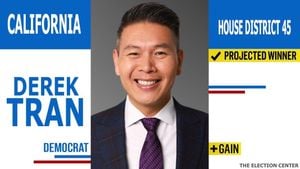A school district in Texas has stirred up considerable debate after adopting a controversial new policy concerning how teachers should address students using pronouns. The Keller Independent School District (ISD) now mandates educators to refer to students by pronouns corresponding to their biological sex as listed on their birth certificates. This decision, which surfaced during a school board meeting on August 24, has sparked discussions among parents, students, and advocacy groups about the significance of personal identity and the role of educators.
According to multiple reports, the Keller ISD's revised policy stipulates not only the use of pronouns aligned with biological sex but also requires parental notification should students choose to use names or pronouns different from what is on their birth certificates. This means if a student feels comfortable identifying as something other than their assigned gender at birth, parents must formally grant permission for the school to address the student accordingly.
The new regulations have drawn sharp criticism from various corners, especially among students. During remarks at the school board meeting, one senior, Kennedy Schultz, expressed frustration, stating, "Every day I walk inside the school, and myself and my peers are suffering. It seems like more and more the school district is prioritizing budget cuts and political agendas over the health of its students." His sentiments echoed throughout the room as other students voiced their concerns over what they describe as the creation of fear and isolation for vulnerable peers.
Another senior, Madison Hickman, took the mic to articulate the feelings shared by many. She stated, "You've created an environment where fear and isolation might just become the norm for our most vulnerable students. I hope this brings you the kind of community you're striving for, one where conformity is valued over compassion. Hate is not a Keller ISD value." This pressure from the student body seems to reflect larger, national conversations surrounding LGBTQ+ rights and the education system's role.
The American Civil Liberties Union (ACLU) has also weighed in on the matter, sending letters of concern directly to the district. They argued the policy discriminates against students wishing to express their gender identity. Despite these warnings, the school board unanimously voted to implement the changes, emphasizing adherence to state laws concerning parental notification.
The governing dynamics around such policies aren't new. Last year, another Texas district, Katy ISD, passed similar measures requiring consent from parents if their child wished to use different pronouns. This appears to be part of a broader trend among certain Republican-led states to pass legislation aiming to solidify parental rights, especially when it concerns sensitive topics such as gender identity and expression.
Advocates for such measures argue they protect the rights of parents, allowing them to have insight and control over their children's upbringing and personal decisions within the school environment. On the other hand, opponents, including various LGBTQ+ advocacy groups, have alerted the public to the potential risks of these policies, claiming they could exacerbate mental health struggles for students who already face societal pressures. For many, the stakes are high, as they assert these environments can impact student wellbeing significantly.
The quarrel over pronoun preferences is, at its core, reflective of broader societal divisions. On one side, there are those who see strict adherence to biological classification as preservation of traditional values. On the other, there are advocates fighting for the recognition and validation of diverse identities, especially within formative educational settings. This student pronoun controversy is more than just about names; it encompasses fundamental questions about respect, identity, and how best to support young individuals growing under increasingly complex societal expectations.
The Keller ISD's decision has become part of this challenging discourse. Will the changes do more harm than good? Could they pose additional barriers for students grappling with identity issues? The answers remain uncertain, generating passionate discussions among members of the community, parents, and educators alike. With the future policies planned and more discussions scheduled, all eyes are on Keller to see how this situation evolves and the impact it has on student experiences moving forward.
Beyond Keller, the conversation around pronouns and educational policy is likely to resonate across the nation. Advocates and those against such policies are vying for attention, attempting to mold the narrative surrounding equity and supportive environments for all students. Whether through demonstrations, legal challenges, or community forums, the future of educational policy on such delicate matters appears set to evolve as public opinions shift and activists amplify their causes.
This isn’t just about Kathy exclaiming her excitement for prom or Billy trying to figure out math homework; it’s about much more. It’s about how schools navigate one of life's most fundamental human experiences: how we perceive ourselves and how we wish to be seen by others. These young individuals are trying to carve out their identities against the backdrop of traditional expectations and the ever-changing society. Indeed, as they step together toward more significant changes, it begs the question — how can we build bridges rather than walls?
With divisions evident and communities bursting with diverse voices, it’s clear the conversation around pronouns will go on. But for now, the Keller ISD has sparked what seems to be the latest chapter—a dramatic interplay of personal identity, parental authority, and educational guidelines. It’s bound to be one debated endlessly as next year’s school enrollment draws near, compelling everyone involved to confront the challenges of balancing rights and responsibilities.



